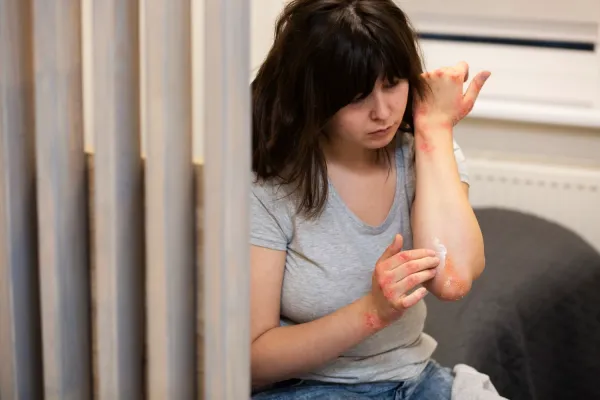Over weeks, the patches spread, darkened, itched, and began to crack. In fact, being a die-hard Game Of Thrones fan, I joked around that I'm developing the fictional disease called Grayscale! But things didn't get better, the jokes stopped being funny, and as my feet started itching and getting red blotches too, I was seriously worried. Multiple visits to a dermatologists confirmed what I had never heard before: I had , an autoimmune condition that causes skin cells to multiply rapidly, forming thick, red, scaly lesions.
What followed wasn't just a medical diagnosis, it was a shift in how I saw myself. Every social interaction, every handshake, and every short-sleeved outfit became a negotiation with my skin and self esteem. I tried every prescribed cream, followed every new treatment regimen recommended by doctors, but what took me by surprise was not the physical discomfort. It was the mental and emotional fatigue.
Over the years, I've learned that psoriasis affects far more than your skin. from India now confirm what patients like me have long known: The mind often bears the heavier burden. On this World Psoriasis Day, I look back on my journey, from confusion and stigma to control and acceptance, and on what science says about the complex relationship between psoriasis and mental health.
The First Flare-Up: When Skin Became A Mirror For Stress
I was in my late twenties when psoriasis first struck. It started small, with just a patch on my fingers, but by the time I noticed the redness on my hands, the disease had already spread. What followed were cycles of flares and remission, hospital visits, steroid creams, and lifestyle overhauls.
I learned that psoriasis is chronic and autoimmune, meaning that your body mistakenly attacks its own skin cells. Stress and infections often trigger flare-ups. Dermatologists told me to "stay calm," but the irony was hard to miss: How do you stay calm when your skin feels like it's on fire?
A 2024 cross-sectional published in the Indian Journal of Dermatology found that psoriasis significantly impairs most psycho-social domains of life, including work, relationships, and self-esteem. This was certainly true in my case.
When The Pandemic Made It Worse
During the COVID-19 pandemic, constant handwashing and sanitiser use triggered my first relapse in over a year. Though only my hands were affected this time, the emotional toll was far heavier. I avoided social contact, hid my hands on video calls, and grew more anxious than before.
A 2021-2022 from Assam found that over 60% of psoriasis patients experience psychiatric symptoms like anxiety and depression. Isolation and uncertainty during the pandemic worsened these effects for many.
It was then that I realised stress is one of the most powerful triggers. Therapy, mindfulness, and breathing exercises slowly became as essential as moisturisers and medication.
A Change Of Place, And Perspective
In 2021, I moved to Pune for a slower pace of life. The cleaner air and lower stress helped, but the real transformation was internal. I stopped treating psoriasis as an enemy and began to listen to what it was trying to tell me. Fatigue or flare-ups became signals to rest, not punishments to endure.
A 2020 North Indian highlighted how internalised stigma, the belief that one's skin condition makes them "lesser", is one of the biggest predictors of depression in psoriasis. Once I accepted that it wasn't my fault, the healing started for real.
Back In Delhi, But Stronger
When I returned to Delhi four years later, I feared the smog and stress would undo everything. But this time, I was prepared mentally and physically. I stocked up on gentle moisturisers, stayed hydrated, and made stress management non-negotiable.
A 2024 in the Asian Journal of Medical Sciences found that early psychological counselling and lifestyle support improve treatment success rates among psoriasis patients. Managing psoriasis, I realised, isn't just about dermatology. It's about balancing the body and mind.
Living With Psoriasis Today
Today, my skin is mostly clear, but my goal isn't "perfect skin." It's balance. I watch out for my triggers: late nights, dry weather, skipped meals. I moisturise regularly, eat a wholesome diet, and rest without guilt.
If you've just been diagnosed, here's what I've learned the hard way: psoriasis is lifelong, but it doesn't define you. You can lead a healthy, fulfilling life once you learn how to listen to your body.

Photo Credit: Pexels
Tips For Anyone Newly Diagnosed With Psoriasis
- See a dermatologist early - Don't rely on over-the-counter creams. A proper diagnosis helps you start the right treatment faster.
- Identify your triggers - Common ones include stress, infections, cold weather, alcohol, and some medications. Keep a symptom journal.
- Moisturise, always - Dry skin worsens flares. Use fragrance-free, hypoallergenic moisturisers, especially after bathing.
- Don't skip mental health care - Therapy or support groups can help you manage the anxiety and stigma that often accompany psoriasis.
- Be mindful with skincare - Avoid harsh soaps, scrubs, and hot water baths. Choose mild cleansers and pat skin dry instead of rubbing.
- Eat balanced, anti-inflammatory foods - Include omega-3-rich fish, fruits, and vegetables. Limit processed foods and excessive sugar.
- Protect your sleep - Poor sleep can worsen inflammation. Establish a calming bedtime routine.
- Talk openly - Don't hide your condition. Educating friends, colleagues, and even family helps reduce stigma.
- Join a community - Psoriasis support networks (really use social media here, because there are many support groups) can connect you with people who understand.
- Be patient with yourself - Flare-ups are not failures. Healing takes time, consistency, and kindness toward yourself.
taught me that healing isn't linear. It's cyclical, like the disease itself. There are flare-ups, but there are also calm, clear stretches of renewal. What makes the biggest difference is not just what you apply to your skin, but what you give your mind in the form of patience, attention, and compassion.
Disclaimer: This content, including advice, provides generic information only. It is in no way a substitute for a qualified medical opinion. Always consult a specialist or your own doctor for more information. NDTV does not claim responsibility for this information.
References:
1. Indian Journal of Dermatology, 2024 - Quality of Life in Psoriasis: A Cross-Sectional Study
2. PMC, 2023 - Psychiatric Morbidities and Their Impact on Quality of Life in Patients With Psoriasis
3. PubMed, 2020 - Internalized Stigma and Psychiatric Morbidity Among Patients With Psoriasis in North India
4. Asian Journal of Medical Sciences, 2024 - Psychological Impact on Quality of Life in Psoriasis: A Systematic Review

 Photo Credit: Pexels
Tips For Anyone Newly Diagnosed With Psoriasis
Photo Credit: Pexels
Tips For Anyone Newly Diagnosed With Psoriasis